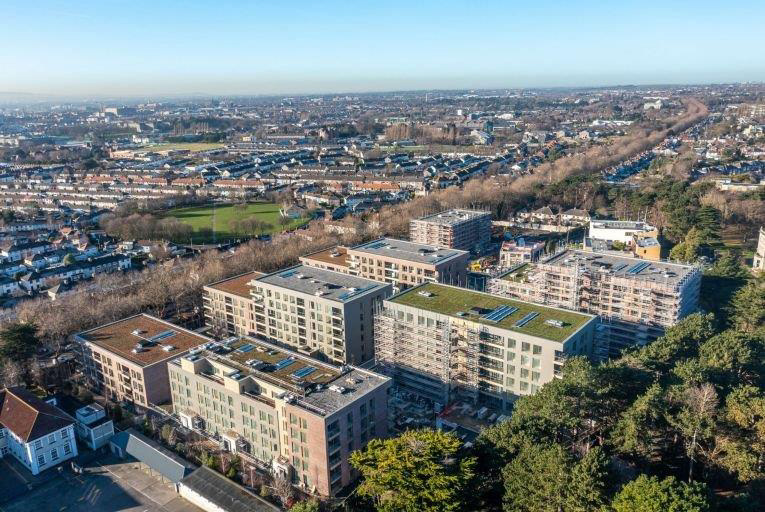Tina-Marie O’Neill
Property agent Hooke & MacDonald’s latest half-year investment report on residential investment in the Greater Dublin Area shows that the multi-family/private rented sector, or PRS, has been the most active investment asset class in Ireland for the past three years.
The report, a comprehensive analysis and review of all aspects of the multi- family investment sector, also contains projections for the year ahead including more investment interest in the commuter counties surrounding Dublin as well as a positive increase in regional city demand (in Cork, Galway and Limerick), and from new capital sources. They did note, however, that regional rental stock is at chronically low levels.
In the past five years, the multi-family/PRS sector has attracted more than €7 billion from Irish and international funders and investors, and is facilitating the construction of in excess of 12,000 new homes which, when fully completed, will house more than 25,000 people.
Some of the key findings of the report show that the ‘living sector’, which includes multi-family properties as well as logistics and life sciences, continues to attract funding and increased allocations of funding from international capital markets.
Ken MacDonald, Hooke & MacDonald’s managing director, said: “With the right conditions, housing supply in Ireland has the potential to benefit from these capital trends as the Irish multi-family investment market continues to mature, underpinned by a rising population, strong economic rationale, low vacancy rates, positive portfolio performances over the last two years, and a strong need for new homes.”
The report cited 4,670 multi-family properties as selling in Dublin last year across 36 main transactions of over €2 billion. The majority, some 87 per cent of them, were new-build properties.
The largest sale was the Ardstone transaction which involved multiple developments in the GDA and a reported €450 million for about 900 new- build properties.
The largest transaction in a single location was the first major Irish residential forward-funded sale of 435 apartments at 8th Lock, Royal Canal Park, Dublin 15 for €200 million, which is being developed by Ballymore Group and forward-funded by Union Investment. Ballymore was advised by Hooke & MacDonald on the transaction.
Cairn was another big hitter, with sales revenues of €240.5 million in two significant transactions, selling 342 apartments at Griffith Wood in Dublin 9 to Greystar for €176.5 million and a further 107 apartments at Rostrevor Place in Rathgar, Dublin 6 to Hines European Core Fund for over €63.55 million.
Park Developments also completed a large forward sale in the year, achieving €127 million for the sale of 297 apartments at East Village, Clay Farm in Dublin 18.
Some 64 per cent, or 3,971 properties completed in Dublin in 2021 were apartments, an 84 per cent increase on the previous year; however that represents only a fifth of the demand in the capital.
The agent also highlighted a disconnect between local council aspirations for development, national policy and market realities which could put the future of the apartment construction and rental sectors at risk by way of proposed changes in the draft development plans for Dublin City Council and Dún Laoghaire Rathdown Council, for example.
Given expected and significant growth in the country’s population since the last census, the agent called for a review of the low National Planning Framework (NPF) housing completion projections in light of much higher current and future needs.
The report also examined purchasing trends and the exodus of smaller landlords from the market; pricing; prime yield performance, which is stable for new apartment builds and low/contracting for city centre, south Dublin suburbs and both inside and outside the M50 and the commuter belt.
It also looks at challenges to the multi-family sector, including the impact of the global pandemic, the effect of greater economic forces, housing strategy and framework issues, planning system problems and what is involved in meeting Ireland’s housing needs through the government’s Housing For All plan.
The report said: “The planning system is not fit for purpose and the out-of- control objector free-for-all, and now commonplace judicial reviews, in relation to new residential developments is grossly unfair to those in need of housing – bizarrely it’s not just well-housed members of the public that are objecting to new schemes but it’s also disingenuous politicians who are doing so, putting populism before principle.”
Also worth a read is the forensic examination and assessment by Downey Planning of the changes to the Strategic Housing Development (SHD), the new Large Scale Residential Development (LRD) process and other key changes to planning policy and legislation.
Hooke & MacDonald agents noted that the Dublin suburbs have seen much of the investment activity for new-build stock over the last four years and this is expected to continue.
“Opportunities in the wider Dublin area including Wicklow, Kildare and Meath are going to become more prevalent – in most cases this is the only way apartment developments are viable as Build-to-Sell pricing does not support funding or construction. Forward sales/purchases will remain the most prevalent form of investment for new projects,” the report said.
“Just over 20,000 new homes were built in Ireland in 2021. With a continued strong performance by homebuilders this could rise to over 26,000 in 2022 and to over 31,000 in 2023. However, this is very much dependent on the government dealing with funding and viability issues for apartment delivery and taking urgent legislative action to deal with planning objectors and judicial reviews which are holding up and putting at risk thousands of new homes for the sale and rental markets.
To read the report, see hookemacdonald.ie/reports
Article originally published in the Sunday Business Post, 13th March, 2022



